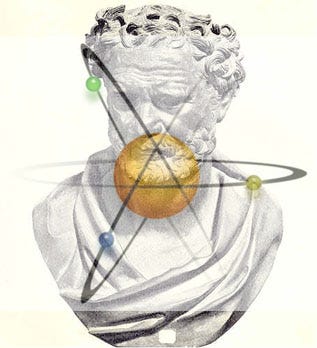Dear Classical Wisdom Reader,
“If you believe in The Science, which I do, then you would...”
Raise your hand if you have heard this one in the last couple of years. While I can’t obviously see you through the computers (that would be weird… and I’m not Mark Zuckerberg), I can imagine a good deal of you have a mental hand raised.
It’s a curious statement, really, when you think about it. One that seems so contradictory at first, second and even third glance, that it’s quite shocking it’s become so popular... but people use it all the time, and so I think it essential to pause for a moment and really investigate the term.
Clearly I’ve got a bone to pick, dear reader, so I’m taking you along for the ride...
But before I do, I fear I must indulge in the usual throat clearing. I’m talking about science and language... not politics. While this has sadly been conflated in the past, I think we should all return to a time when science is science and politics are politics. I don’t care about which team someone supports, which flag they salute, which corrupt politician they vote for.
Indeed, I remember as a child when visiting the cancer research lab my mother worked in...her colleagues came from around the world, representing every creed, race and religion you could imagine. They didn’t care what the other person ate, what prayers they uttered, which God they worshipped. At least, not in the lab. They cared about the results of their research, the diligence of their reporting, their commitment to quantifiable testing.
So, with all that in mind... I’d like to vent my spleen for a moment regarding the popular phrase “Believe in the Science”.
First of all, science is not something you ‘believe in’. Indeed, the very nature of science is to provide evidence, not demand faith. Trying to state that one needs to accept something without proof is antithetical to an, “enterprise that builds and organizes knowledge in the form of testable explanations and predictions about the universe”.
Why are we telling people to ‘believe in’ it? The whole point of science is to question and find answers.
Similarly the concept of ‘the science’ is equally frustrating. A process, a systematic method for evaluating the world around and within us, can never be surmised by a simple, definitive article. Trying to encapsulate a concept that intrinsically demands contradictions, that feeds and grows by criticism and only progresses by reason-induced challenges, would never solidify into some amalgamated ambiguous mantra.
What is “THE” Science, pray tell? Can you imagine telling any ancient scientist (or indeed even one five years ago) that this would become a common phrase? Can you imagine the cringe?
Science itself is a process, not a particular result. It is politically agnostic, culturally insensitive and racially indifferent. It is not subject to our opinions, nor our “beliefs.”
But perhaps I’m wrong, dear reader. I’ve been living at the end of the world, out of the loop... maybe I missed the memo? Or am I just being a bit finicky?
Like the scientific process I hold so much respect for, I’m always willing to change my opinion if proved otherwise... so please feel free to comment below or write to me with your thoughts on the matter...
And in the meantime, I have a wonderful article for you today... in honor of SCIENCE (sans ‘The’). We’ll look at some of history’s first scientists... A fascinating branch of the Pre-Socratics, the Atomists.
Of course, they didn’t get everything right, but what they DID do, was promote a reason based approach to the world around them, leaving behind a rigid system of belief... a remarkable endeavor, both then and now.
All the best,
Anya Leonard
Founder and Director
Classical Wisdom
Pre-Socratic Atomists: Pioneers of Modern Science
Written by Ed Whalen, Contributing Writer, Classical Wisdom
The pre-Socratic Atomists were a group of ancient thinkers who proposed a materialistic theory of the cosmos. Among the first to propose a mechanistic view of the universe, the Atomists argued that the world was composed of atoms. Their work was crucial in the development of ancient philosophy and modern science.
The Origins of pre-Socratic Atomists
Parmenides of Elea was a pre-Socratic philosopher from what is now Southern Italy. Possibly the first monist (monism posits that all things derive from oneness), Parmenides argued everything was part of a single, unchanging mass. His denial of change greatly influenced the first Atomists.
Leucippus is regarded as the first true Atomist. Living in 5th century BC, Leucippus was likely born in Miletus, which is located in modern-day Turkey, and later moved to Abdera, a wealthy Greek city on the Thracian coast. Many, including Aristotle, claimed the Leucippus was the most important Atomist.
Democritus was born in the city of Abdera in about 470 BC into a wealthy family. He was very well travelled, and may even have even visited Babylon. When Democritus returned to the Greek settlement in Thrace, he conducted numerous scientific experiments and wrote several works on the theory of atoms.
Democritus was a polymath and in ancient sources was portrayed as the ‘laughing philosopher’ because he was always mocking the stupidity of his fellow citizens. Despite this, he was hugely respected in his home city and is credited with the founding of the influential School of Abdera.
The Theory of Atomism
The pre-Socratic Atomists, especially Democritus, held that the world was made of atoms — defined as the smallest elements in the universe. Atoms had several characteristics: they were invisible to the naked eye, indivisible and eternal. It was believed that atoms could come together and form complex structures, making them the building blocks of the entire world.
For the Atomists, the world consisted of matter which followed specific patterns and laws. Democritus argued that the atoms moved in a void and that all change was a result of them coming together and breaking apart. There were a variety of different atoms that explained the variety and dynamism observed in the natural world. Atoms thus explained natural events and phenomenon. Democritus and his followers believed that the world came about as a result of a collision of atoms.
For the Atomists, there were only naturalistic explanations of reality. This has been likened to 19th-century scientific ideas about the world, and for this reason many see the atomists as the forerunners of modern science. The Atomists were very interested in observing nature and may have developed early scientific theories. For instance, Democritus developed the theory of epistemology, which held that all knowledge derived from sensory experiences. In this way, he can be regarded as a forerunner of the empiricists.
For Democritus, the faculty of reason existed to interpret sensory data, creating true knowledge of the world. Interestingly, the philosopher also believed that humans had a soul, but that this too was made out of atoms. He held that many cultural institutions were the result only of our mental cognitions and had no basis in reality. As a result, cultural institutions and beliefs could be changed for the benefit of humanity. Because of this, many scholars have seen Democritus and members of his school as early humanists. Indeed, Democritus and his followers believed that the ancient gods were a human invention.
The Atomists believed that humans originally lived like animals but developed societies and technology in order to survive. Sadly, there is much we do not know about the pre-Socratic philosophers, as nearly all their works have been lost.
The Influence of Atomism
The pre-Socratic Atomists had a huge influence on later philosophy, especially in the Classical World. Aristotle was very familiar with the works of Democritus, but he opposed the Atomists. However, the School of Abdera influenced the Epicureans, who held that only rational pleasure was the only virtue. Their materialism and metaphysics are based on Atomist teachings.
Many Christian scholars believed that Democritus and his followers were atheists. Historians believe that the School of Abdera contributed to the widespread doubts among the elite and intellectuals about the existence of the gods.
The Atomists also appear to have influenced the Sophists. The great Sophist Protagoras came from Abdera and his relativist philosophy was possibly based on Democritus’ epistemology. Another school influenced by the Atomists were the Skeptics. Anaxarchus, another citizen of Abdera, was a philosopher who accompanied Alexander the Great on his conquests. Anaxarchus’ unique interpretation of Atomism led him to doubt the reliability of knowledge. This is regarded as an important influence on Pyrrhonism and its teachings of philosophical skepticism. During the 17th century in Europe, many scientists were inspired by the Atomists and revived their teachings.
Conclusion
The pre-Socratic Atomists were revolutionary thinkers. Among the first in history to propose a materialistic and mechanistic theory of the universe, their theory of atoms promoted a scientific and rational view of the world. Many feared them, but they were very influential. They not only inspired later philosophers such as the Epicureans, but they may also have laid the foundation for modern science.








Great topic! I love the idea of an atomic soul. It would make for an excellent heavy metal band name.
I couldn’t agree more with the sentiments in the intro. I also get turned off by “I believe in science” mindset I hear so often these days. As if science has already answered all our questions minus a few around the edges. As if science can possibly get the bottom of our most fundamental questions.
I appreciate this ‘banned’ Ted talk which explores the tension between science as a method of inquiry and science as a dogmatic worldview.
https://m.youtube.com/watch?v=sF03FN37i5w
Kudos to you for venting about “the science”!